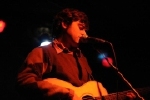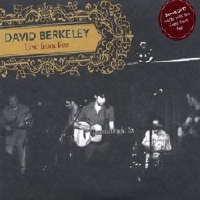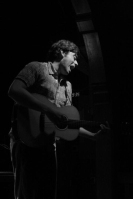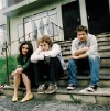|
|
|
David Berkeley |
|
|
|
|
|
Having early talent as a performer, David Berkeley rekindled his interest in music after college. A Harvard educated nature lover, Berkeley's songwriting is a wonderful blend of interesting character studies and vivid imagery that helps him stand out from other singer/songwriters. Way Cool Music sat down with David during a swing through the Midwest to learn about his musical influences, the importance of support from family and friends and how to handle a compliment from Dido. |
|
|
|
|
Way Cool: |
Tell us about your music background. |
| |
|
|
David Berkeley: |
|
I went to a very performance oriented nursery school that was a real hippie kind of place. All the teachers would have guitars around their necks and weíd call them by their first names. We did a lot of singing and plays. This was when I was 3 or 4. I was very quick to learn how to read and speak so I got the parts that had speaking or singing partsÖIím serious. There is a true story on my website that my babysitter would sell Avon products on the side. She would walk me around the neighborhood when she was selling door Ė to Ė door. I would sing to the neighbors and they would give me cookies. Iíd sing the Titanic song. So, those two things were formative early on. But, then I really didnít do music for a long time except getting a guitar in high school and trying to get girls with it. I never studied music, but I always listened and had a good ear for singing what I heard. |
|
 | |
| |
|
|
WC: |
Did you get the girls? |
|
|
|
| DB: |
Not as much as Iíd like too. I also played the tuba when I was young so that kind of undid anything the guitar would have done. |
|
|
|
|
WC: |
When did you begin to focus on music? |
| |
|
|
DB: |
I started writing songs really late. I used to learn how to play Grateful Dead songs, Paul Simon songs and Neil Young songs. But, the first song I wrote was junior year in college. I took some time off and lived in Santa Cruz, California with the guy who now plays bass with me. We both took some time to learn. He was much more advanced in songwriting and I wanted to learn from him. I wanted to devote some time to writing. I wrote maybe 3 tortured songs in that 8-month period. |
|
|
|
|
WC: |
What was the reaction of your family and friends when you decided after college, a Harvard educated boy, that you were going into music? |
| |
|
| DB: |
My parents have been super supportiveÖmaybe even too supportive. They like my music a lot. Most people think that would be a big battle with them. They just want me to be successful. Iím not sure if I play small to mid-level clubs for the rest of my life that theyíll be as happy as they seem now. My friends seem to like it too. It feels like more of a surprise to me than to them, which is kinda funny. Iíll run into old friends who say, ďOf course thatís what you are doing. You were always playing music so it makes perfect sense.Ē That feels really good because it doesnít feel like that to me. Iím constantly wondering where I am and how I am doing this. Iíve gotten very good support all along. Thatís really important because itís not an easy career path and a pretty solitary path, so it makes it a lot easier to get affirmed by people that you trust. |
| |
|
|
WC: |
How did you get interested in using traditional bluegrass instruments like mandolin in your music? |
|
|
|
|
DB: |
I started believing that I wanted to make music that was pretty unadulterated and unaffected. I still want to make music thatís unaffected, but I donít mind mixing in electric instruments anymore. But, initially I was drawn to a very natural sound. Nick Drakeís album, Pink Moon, had a big influence on me. That might have a little piano on it, but itís basically just voice and acoustic guitar and I loved that. Also, it was kinda boring to be a conventional folk rock band with two acoustic guitars, maybe an electric guitar, bass and drums. I also met a mandolin player through the guy who played guitar with me and produced my first two records. We formed a good relationship. It wasnít a huge choice, but it was a combination of my inclination and the fact that he was there. I play in all sorts of combinations. Playing with a mandolin, upright bass and me is a really great trio. It looks cool and offers a really full sound. The neat thing about a mandolin, without being too geeky musically, is that the frequency of pitches are almost all above the guitar sound so you have these isolated sounds that donít block each other. That is opposed to the cello, which I love but is right in the same range as my voice. Itís fun to harmonize with or sing in unison with, but covers the same space. |
|
|
|
|
WC: |
Why did you decide to put out a live CD? |
| |
|
|
DB: |
|

|
|
I get a lot of people who asked for a live CD. I donít like hearing that because I think they donít like what Iíve recorded. I felt like people wanted it, on one hand. But, I also felt like the records didnít totally capture what our live shows were like, which is what a lot of artists say. And, I didnít feel like my voice sounded the way I wanted it to sound on either of my records. My voice sounds closer to the way I hear it on the live CD. The biggest motivation was that this club, Fez, that was our home and was very important to me and my musical development, was closing. The woman who ran and founded Fez, Ellen Cavolina Porter, basically discovered me and booked me into all sorts of shows before I deserved them. She helped me get into SXSW the first year and booked my first tour cross-country and was very important to me. So, when Fez announced that it was closing, and nothing had been recorded there, we thought it would be a great thing to document. If you compare it to other live CDs that are recorded in large stadiums, you hear the huge crowd noise, which is great, but that wasnít what Fez was. Fez was this intimate, cabaret Ė style place in New York that you had to walk through a restaurant, down a flight of stairs, into a whole other world to itself. Thatís what you feel when you listen to that CD. There is crowd noise, but itís still really intimate and thatís the way those shows were | |
| |
|
WC: |
Where is your homeroom now? |
|
|
|
|
DB: |
I played a great room in Philadelphia called The Point, which has recently closed as well. I donít know if I have a home place. Right now, Iím playing at Joeís Pub (New York), which is beautiful, but itís hard to feel ownership. In Atlanta, I play at Eddieís Attic. That is sort of my home down there. But, I donít have a place like Fez any more. And, I will potentially be playing bigger rooms that you donít feel the same thing. Thatís OK because Fez was a special place and it was there for me. I wish it had stayed a little bit longer. |
|
|
|
|
WC: |
A number of your songs involve traveling. Did that come before you began touring a lot or as a result? |
|
|
|
|
DB: |
It must be as a result of. Before I was playing as much, I was writing songs that mentioned or were about New York and thatís were I was living. But, itís not like what I picture Sufjan Stevens doing. Itís rare that I will write a song about Chicago when Iím in Chicago. Itís more that these places and images get into my brain and years later they will come out in some way. It is also a conscious attempt to make certain things more specific and rooted. I really like when you can combine images that are at once very pointed and specific, but also broad and general. You can do that easily with places. I can give you a name of a place and immediately you are there, but then the next image is very universal, you are thrown back out. Itís a neat juxtaposition. Now, Iím trying to avoid writing about places. |
|
|
|
|
WC: |
It is an easy way to get applause from an audience of the mentioned place. |
|
|
|
|
DB: |
You also have to be careful. Like in the song, ďRed,Ē it talks about Cleveland in a negative sense so itís a little dangerous to play it in Ohio. Iíve only played in Cleveland once, and I changed the lyrics to Pittsburgh. I got a lot of laughs and praise right then. But then those people bought the recordÖI got a lot of negative emails later on and they felt totally duped. |
|
|
|
|
WC: |
Tell us about Ten Good Records. |
| |
|
| DB: |
Ten Good Records is a fictional entity created by the guy who produced my records and my mandolin player, Alex Weinstein and Adam Buchwald. The idea was that they basically create a label that help fund and produce the records that Alex worked on. Itís a bunch of good people whom Iím good friends with that doesnít have a bunch of money behind it. |
| |
|
|
WC: |
What is the most surprising place or topic that youíve gotten inspiration from? |
| |
|
|
DB: |
|

|
|
I get influenced by the outdoors a lot, but thatís not necessarily surprising. I get influenced by art a lot. There are interesting images that I can steal from. I have a notebook that I bring with me and will jot down bizarre visual things, just isolated things. The last time I was here (Chicago), I was in the warehouse district going around to different galleries and remember seeing bones of a dead horse. That hasnít made its way into one of my songs yet, but if it does, it is directly related to that painting. Poetry, certainlyÖI was on a Yeats kick for a while. Iíll read a novel and there will be one turn of phrase or shade of a character that I can pluck out of context and re-use in a different way. Iím very influenced by relationships in my life. I had a long visit with my parents this summer and looked at their relationship in a different way and wrote a song about that. You wouldnít know about that if I didnít tell you. Itís not that transparent or literal. I try to write emotion inspired songs. Those emotions come from a number of different things that I interact with in the world. It may be a person or something I see like a balloon caught in a treeÖand thatís not in a song yet, but may be. But, that feeling will lead into a song and what started it may not end up in the song, but thatís how I got there. | |
| |
|
|
WC: |
Youíve mentioned that Nick Drake has been an influence on you. Are there other musicians that youíve modeled your career after? |
| |
|
| DB: |
I definitely havenít modeled my career after Nick Drake since he is no longer alive. I havenít modeled myself or tried to write songs in the style of anyone. Iím not a good enough songwriter to imitate people. If I could, I would. The lyrics of Paul Simon Iíve been inspired by...some of Elliot Smithís stuffÖNick Drake in terms of creating a mood. The balls of The Band and Neil Young have inspired me. I used to listen to the Grateful Dead a lot. Jerry Garcia has definitely inspired me. |
| |
|
|
WC: |
What are you listening to now? |
|
|
|
|
DB: |
I still listen to a lot of those people. I listen to harder stuff now. By ďharder stuffĒ I mean Wilco, not much harder than that. I like The Old 97ís. I end up listening to stuff by people that Iíve played with. Iíve played with Rhett Miller and Gary Jules and Ray LaMontagne whose CD is just great, obviously. I listen to Bonnie Prince Billy. I listen to music that is a lot like mine, which may be counterproductive. And then Iíll go a long stretch without listening to music. When Iím in the middle of writing songs, I donít want to be listening to other things. It gets hard to stay focused or Iíll get annoyed because Iíll think, ďThat song is so much better than what Iím working on. Why am I wasting my time?Ē Occasionally, in the middle of writing a song, I might drive 6 hours in silence or listen to a book on tapeÖsuper cool. |
|
|
|
|
WC: |
You write about different times in history. Have you ever thought about what era would have suited you the best? |
|
|
|
|
DB: |
Today, I saw pictures of Paris in the Ď50ís and Ď60ís, which would have been a good time. Aside from wanting to check out different eras, Iím fine with living now. You canít just take the good. As much as I would have liked living in Roman times, Iím not sure I would be doing as well as Iím doing now. |
|
|
|
|
WC: |
What are some of your most memorable touring experiences? |
| |
|
|
DB: |
|
I loved being on the road with Nickel Creek. They were just so fun to be with. That was a lot of fun. Sara (Watkins) would come on stage and sing with me. The shows last year with Ben Folds were great because his crowd is just so amazing and supportive. The best story is opening for Dido at the Beacon Theatre in New York. I had just gotten married, on June 12th of the year before last, and on June 13th we were up in Vermont, hanging out and swimming in a lake. We, lazily, started to drive back to Long Island and were on the Merritt Parkway about an hour and a half north of New York. I got a call from my manager, who had been at the wedding with us along with the rest of our friends, saying, ďWhere are you?Ē I said, ďIím on the Merritt.Ē I was in a t-shirt and swimming shorts. He said, ďWell, can you get to the Beacon Theatre in an hour and a half?Ē We had just passed a sign that said 85 miles to New York City. He said, ďIf you can get to the Beacon by 8pm, you can open for Dido.Ē I looked down and thought, ďI canít perform like this: in sandals and shorts.Ē But, everyone I knew who could get my clothes and guitar were up in Vermont or out of reach. So I had the awkward job of calling friends that we didnít invite to the wedding trying to get them to find me some clothing. I finally found someone to get me some clothes and I used one of Didoís bandís guitars. I hit the gas driving on the Merritt, which is a pretty curvy road. We passed an ambulance at one point. We slammed into the city, which is just amazing that we were able to get to the Beacon in time; that just doesnít happen. I ran into the back door, met the guy, pulled on my jeans, and someone threw a guitar around my neck and pushed me out on stage to a packed theatre. I got to play two nights. The next night was much more tame which made me that much more nervous. Dido said that I had an absolutely exquisite voice, which is the best compliment Iíve ever gotten from Dido. I said, ďYou got a pretty good voice yourself.Ē |
|
|
 |
| |
 |
| | |
| |
|
| WC: |
Tell us about shooting the videos on CMT. |
| |
|
| DB: |
Oh, you saw those? That was when I was doing shows with Ray Lamontagne. I was with my bassist. We got a call from someone who works for CMT and had seen me a bunch of times in Nashville. So, we were pretty excited and pulled up expecting to be brought into a performance space. They keep pulling us past the nice part of the office into this back section of this office building where there were a bunch of cubicles of empty space. They had a guy with what seemed like a storm flashlight on us and a handheld camcorder. My bassist, Will Robertson, had never been in front of a camera before so he was pretty uncomfortable. I was pretty uncomfortable myself. I broke a string during one of the songsÖwe didnít even redo it, we kept it in. I havenít even seen it. |
|
|
|
WC: |
If you have a good sense of humor about yourself, you should watch them. |
|
|
|
|
DB: |
Yeah, I donít know if I do. |
| |
|
|
WC: |
Whatís scarier for youÖsinging a new song on stage for the first time or rafting a class 5 rapid for the first time? |
| |
|
|
DB: |
Definitely rafting. Although, singing a new song is the scariest part of performing, it doesnít compare to rafting. Iím not gonna die singing a song. Iím more scared when Iím rafting with other people in my boatÖthatís what is scary. The worst thing about singing is if I had to beg people to stay after Iíve sang a song. Certain audiences are more supportive to playing a new song. I guess the more I perform the more I donít mind messing up a little. Iím not there yet, but a little more ok with it. There certainly are times when I mess up. Most times no one notices. Thatís either a good or a bad thing. |
| |
|
|
WC: |
Now, we'd like to play a game we call "7 Questions." |
|
|
|
|
|
|
|
|
|

|
|
|
|
|
What's the worst job you've ever had? |
|
|
Being a caddy for 60-year-old women who flirted with me for 4 hours while I carried their damn bags. |
| |
|
|
|
What's your favorite movie or lyric quote? |
|
|
Paul Simonís lyrics from Graceland, ďAnd she said losing love/Is like a window in your heart/Everybody sees you're blown apart/Everybody sees the wind blow." |
| |
|
|
|
Who would you want to star in the movie of your life? |
|
|
Owen Wilson. |
| |
|
|
|
What's your favorite TV theme song? |
|
|
The Jeffersonsí themeÖĒMoviníon Up.Ē |
| |
|
|
|
If you were a superhero, what would your name be? |
|
|
Oh GodÖthatís my answer. No, how about Rat Boy? |
| |
|
|
|
What do you want to do/be when you grow up? |
|
|
A grandpa. |
| |
|
|
|
Finally, why are there so many songs about rainbows? |
|
|
Are there? There aren't. | |
|
|
|
|
|
|
|
To find out more information about David Berkeley, visit his website at www.davidberkeley.com. |
|
|
|